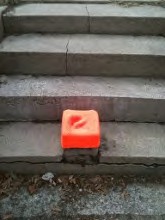 A while back, a big hunk of concrete cracked off of the front edge of a step leading to my terraced yard. I knew that it was too cold for any kind of concrete repair to hold, but I wanted to mark the potential hazard so that people would notice it despite the snow and ice that are still a risk here in March. So I set a concrete block over the hole, and then I adorned it with a blaze orange hat. Until I can get it fixed, you’re not likely to miss the problem and hurt yourself.
A while back, a big hunk of concrete cracked off of the front edge of a step leading to my terraced yard. I knew that it was too cold for any kind of concrete repair to hold, but I wanted to mark the potential hazard so that people would notice it despite the snow and ice that are still a risk here in March. So I set a concrete block over the hole, and then I adorned it with a blaze orange hat. Until I can get it fixed, you’re not likely to miss the problem and hurt yourself.
I thought it was a practical temporary solution. It wasn’t until my neighbors and our mail carrier provided commentary that I realized it might also be viewed as a little wacky. And I’ll just add that this isn’t the first time my untrained approach to home maintenance has caused more seasoned handy people to laugh out loud.
One of the reasons I love working with kid writers is that they don’t yet have a pre-programmed set of writing fixes; the go-to solutions that more seasoned writers habitually fall back on aren’t yet built-in for them. If a student writer doesn’t know how to patch the big crack in their story, they throw in something wacky. Or they take words and phrases that a grown-up might take for granted, and set them on their ears. Sometimes this turns out to be funny, but it can also be fresh and exciting.
One of my all-time favorites is a scene where a student writer had her main character successfully crossing a river only to be confronted by a threatening “herd of turtles.” “Herd” is not the proper collective word for turtles; it should be “bale.” But I would argue that “herd of turtles” creates a great visual for the reader and it’s a lot more fun to read. To me, this is a case where wacky wins out.
As a writing warm-up, why not ask your students to create a fresh new spin on a tired old way of saying something? Brainstorm common idioms with your classroom (use a Google search for a starter list if you’d like), and then ask students to invent new possibilities that paint more vivid pictures or fall more trippingly off their tongues.
In other words, ask them to turn a “turn of phrase.”
